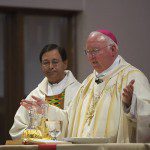1950s
She also would quote the Osservatore Romano when treating capitalism, pitting Rome against supporters of capitalism (among the clergy and hierarchy) in the United States.
Some members of the hierarchy were upset about the actions of certain worker priests. While these actions were rejected for their use of violence, Day saw it as less of a problem than having so many priests embrace capitalism:
…[W]e still do not see why there should be such a furor in the Church while the great mass of priests of the Church go along wholeheartedly with Capitalism, which Count de La Torre in Osservatore Romano¹ called a cancer on the social body of the Church, and worse than Communism. – The Catholic Worker, March 1954.
And two and a half years later, she offers a larger quotation from OR.
Here is what Osservatore Romano has to say about capitalism:
‘Capitalism seizes, confiscates, and dries up wealth, i.e. reduces the numbers of those who may enjoy riches, holds up distribution and defies Divine Providence who has given good things for the use of all men. St. Thomas Aquinas says that man must not consider riches as his own property but as common good. This means that communism itself, as an economic system, apart from its philosophy – is not in contradiction with the nature of Christianity as is capitalism.
‘Capitalism is intrinsically atheistic. Capitalism is godless, not by nature of a philosophy which it does not profess, but in practice (which is its only philosophy), by its insatiable greed and avarice, its mighty power, its dominion.’ – Quoted by Day in The Catholic Worker, October 1954.
The government is spared by Day in this next quote, but wait until the 1960s.
We need to change the system. We need to overthrow, not the government, as the authorities are always accusing the Communists of conspiring to teach to do, but this rotten, decadent, putrid industrial capitalist system which breeds such suffering in the whited sepulcher of New York. – The Catholic Worker, September 1956.
1960s
Of course, this was a consistent position of Day’s, as well as of many other Catholic thinkers and Catholic Worker Inspirations. We’ll close with some portion of one of Day’s diary entries from 1969.
Holy Mother the State must submit to my discursive way of explaining what makes us do what we do. Once Cardinal McIntyre, when he was bishop in N.Y., said to me, “Do not write such long letters,” smiling as he said [this]. Personally he was always very kind to me, a woman, a laywoman. (Not much was to be feared from, or expected of a woman. And a convert, besides.) I was trying to explain our point of view. We were never called to task about pacifism or anarchism. The words did not seem to frighten them as communism did.
They did worry about our attacks on capitalism.
“Sooner or later you will the to take that word ‘Catholic’ off your masthead.” Msgr. Gaffney said. “Of course the Church is committed to the capitalism system.” I wished I had a Dominican magazine, Blackfriars, printed in England to show him, with that headline, “Who Baptized Capitalism?” He would have brushed it off, Irishman that he was, coming from an English order priest and he himself an Irishman and a diocesan priest. That is still another way, between order priests like Jesuits, Dominicans, and orders and secular clergy. There are vestiges of this still all around us.
I was called to the Chancery office another times about a retreat Fr. Fiorentino was about to preach to us. He was another Savonarola, or St. Bernadine, and was a fiery enemy of self indulgence, advocating a strict asceticism which would have wrecked the capitalist system in no time. Abstention from liquor and tobacco, from movies, telephone and radio, from unhealthy recreation. (Montana is a recreation state. Recreation is a billion dollar industry. N.Y. is a summer festival.) […]
We have encountered far more trouble when when we have attacked money in these last 36 years.
When I visited [the] Archbishop doing the steel strike in ’35 he said, “I hear you’ve been visiting the strikers at their headquarters.” Where could he have obtained this info? Spies, informers, in the ranks of the strikers. Associations of steel men, coal operators hired Pinkerton men who in turn hired spies, etc. “That Headline in the June 1937 CW, ‘Cops murder 10 pickets in Chi Strike,’ certainly smacks of class war,” he said, but smilingly, almost as tho he meant, “Communism endorses class war, torments it, and so you can be accused of communism, doing away with private property and godlessness. So of course businessmen suspect you. We know you are good Catholics, you people at the Catholic Worker, mindful of the needy and the poor, but remember, Christ said, ‘The zeal of thy house has eaten me up,’ and he also said, ‘the poor you’ll always have with you,’ so watch your step.”
He did not say this of course, but when I knelt to receive his blessing and to kiss his ring (those were the olden days when we were taught manners) he gave me a little slap on the cheek as bishops do when they confirm you. Did that mean he was confirming me, us, in our mission to do away with war, change the social order, abolish capitalism, overthrow the State (non-violently)?
– The Duty of Delight: The Diaries of Dorothy Day, entry: May 15, 1969
Share something about Dorothy Day and other Catholic Worker Inspirations in the comments and remember that it’s a Catholic position to reject capitalism.
Until next time,
If you have found the content on Keith Michael Estrada’s “Proper Nomenclature” to be useful, kindly consider supporting the cause with a donation.
Use the button below to donate through PayPal:![]()
Thank you!
¹ Count de La Torre, had more to say on Capitalism-Church relations: “A marriage between the Church and capitalism . . . would be invalid according to any treatise de matrimonio on the grounds of disparitas cultus” – L’Osservatore Romano on May 8, 1949.











